
Synopsis : Love at first sight strikes when young Tony spots Maria at a high school dance in 1957 New York City. Their burgeoning romance helps to fuel the fire between the warring Jets and Sharks — two rival gangs vying for control of the streets.
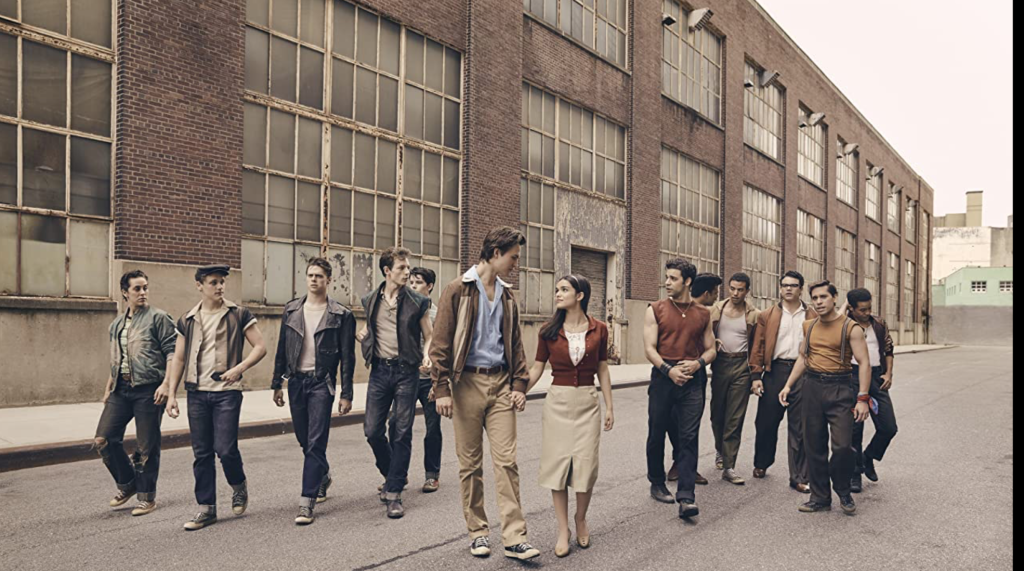
Q&A with Director Steven Spielberg, Actor Ansel Elgort, Actress Ariana Debose, Actor David Alvarez, Actor Mike Faist
Q : Steven, I wanted to start by asking you, the original 1961 movie was the very first movie I ever saw as a little kid, so it has a super special place in my heart. And I think it has a super special place for you, too.
Steven Spielberg : Well, it does. I mean I grew up with a “West Side Story,” I was 10 or 11 when my parents purchased the original broadway cast album. I wore out a couple records over the next year listening and memorizing every song. And then, about four years later when I was a teenager, I saw a film version of West Side Story in Arizona at our local theater and saw it five times in the theater.
Q : So with all that, I’ve also heard that it sort of inspired your career, is that true?
Steven Spielberg : No, I wanted to crash my Lionel Train set is what made me become a filmmaker. I used to crash all my toys all the time that pretty much led to it, basically destruction is what brought me into this business. But the West Side Story was just for me, it was my favorite broadway musical score of all time and it still is as a great score by Leonard Bernstein and Stephen Sondheim.
Q : You have musical numbers in the film, but you’ve never directed a musical before this, and you took this 1957 musical on broadway, and the original 1961 film and made it your own and plunged us so powerfully into the New York street at that time. It took America out into the streets how do you even begin to reimagine this, I mean in terms of the biggest challenge for you in the adaptation, what was the biggest challenge?
Steven Spielberg : Well, the biggest challenge was after I turned 70 years old, deciding to do a genre that I’ve never done before, just the scary terrifying idea of doing a musical for the first time in my career after I think 33 or 34 directed films. And of all musicals, the West Side Story as a reimagining and original reimagining that Tony Kushner and I have been putting on it seat for the last 5, 6, maybe 7 years and that was really a challenge. I mean I’ve never really done anything that I’ve never done before I its entirety.
So this was a lot of different than a comedy narrative, a dramatic narrative, and a science fiction. Because this involves something that I’ve never really had in my movies before except little sort of dalliances and the opening credits to “Indiana Jones and the Temple of Doom” which we did the Busby Berkeley number and there was also a little number in my film, my big hit in 1941. It was a little number of that, it was a fight at the Uso Club, there was bit of jitterbug contest. But when you have dance and song, basically now it limits the ability to cast the film in three weeks, it took us year to cast.
Because I needed to find the performing artists who they had to act great, they had to sing brilliantly, and they had to dance off the charts and they had to exist without doing any of those things in front of a camera. And still make us pay attention to them, and still made us watch them. And I’m just blessed with some of the actors here, they are sitting and talking to you Today.
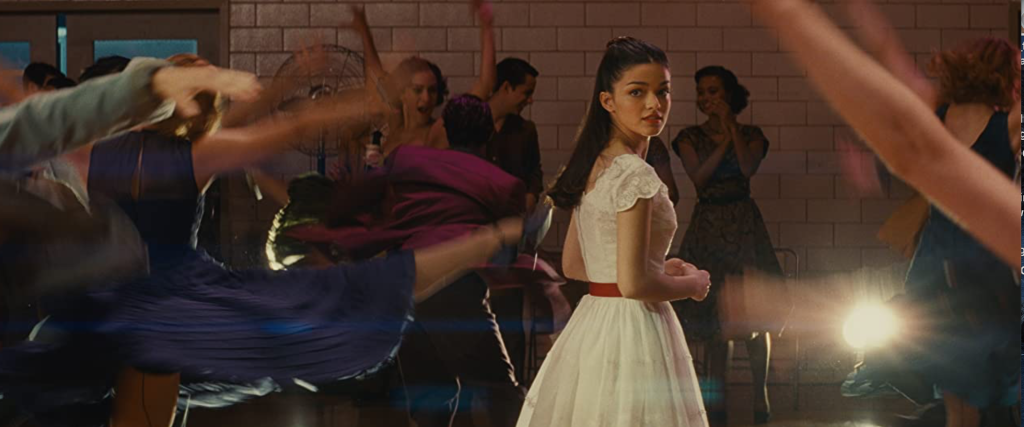
Q : So the 1961 movies, not very much Spanish was spoken. But in this film, there is a great deal of Spanish was spoken which is wonderful because it takes you into the sense of being a part of an immigrant family and knowing how that really works. Can you tell us a little bit about the discussion you had with Tony Kushner about working in all the Spanish?
Steven Spielberg : Tony and I felt very outset of the project that the Spanish should be intermingled with the English. You know, Bernardo is going to speak more Spanish because Bernardo still isn’t sure he’s going to stay in America. Anita is pretty sure this is going to be her home and she is trying to get Bernardo and Maria to speak more English and less Spanish. And so they are freely and subconsciously almost going from English and Spanish.
An Tony and I both together made a decision that never to subtitle the Spanish because that would be very disrespectful the language, it would basically mean that we were doubling down the English and you would hear the English being spoken, then you would read the English as the Spanish were speaking, so that as the Spanish language was coming from all the Latin cast and so it was very important to us, and it’s out of respect for the entire language which really is almost a third of this entire planet that this language needed to be enjoyed by those who speak the language and sort of understood emotionally for those who don’t know know a single word in Spanish.
Q : Over the years, the original film has taken a lot of heat for the fact that people were in brown face or people weren’t looking like Latino, and they were playing the roles and you wisely cast all the Latin roles with Latino actors which is amazing that you got it right. I love to hear just a little bit about the casting process because I know there were thousands of people involved, it was quite a huge process.
Steven Spielberg : Well, for the role of Anita and Maria, and Tony and Bernardo, we have a brilliant casting director, Cindy Tolan of this film, and it was 32,000 individual tapes were submitted to Cindy’s office of young people who wanted to play one of those four roles and that’s why it took a while to cast it. They went through all 32,000 submissions and it wasn’t for three and half months from the time she was accepting submissions to the time Cindy said, “Now it’s time to show some of our choices.” Because the casting directors are very powerful people, the directors only see where the casting directors let us see, so don’t blame us if didn’t get a part, it could be the casting director’s fault. But when the things finally got to us, ironically the second actor I saw on my first day of casting with another 364 days ahead of me was Rachel Zegler who finally got the role of Maria, she was the second person I saw on the first day. I wish she was here…
Q : Well, Ariana. I want to ask you because obviously you were in “Hamilton,” now you’re in another huge phenomenon, the word Oscar is already being used in conjunction with your performance and you are following in the footsteps of someone who played the role and won an Oscar, Rita Moreno famously played the role of Anita. Did you have conversations with her on set about this and did it feel a little bit daunting to walk in those shoes?
Ariana DeBose : Oh, of course it’s daunting. Naturally, it’s any woman who got this role was going to feel some pressure, Rita Moreno is larger than life and this character is larger than life, and both of these women mean a lot to so many communities. So I walked in kind of reluctantly into this casting process, just because I questioned myself whether there was something real to offer. Because what’s the point of duplicating or recycling anything, no point.
But I can tell you that the first day, I met her(Rita Moreno) that I had a big anxiety attack. Once I composed myself, I said I’m so sorry, shall we start over that will be great…and she was like, “Honey, it’s a lot..,” and then she said , “Lean into everything that makes you unique, but other than that you got this.” And I did, I let myself own that, you have to take ownership of anything you do, otherwise I don’t think it’s any adventure specifically mine is going to be successful.
But I got past the 60 years of legacy because I realized when I was 7 or 8 years old, I fell in love with the woman in the purple dress, I loved the way that she moved with reckless abandon and she sort of locked me and I saw myself reflected back to me in some way and there have been many Anitas in my life since that time.
An there came a point while we were filming America actually, where I was like, “Oh, Damn, I’m going to be the girl or the woman in the yellow dress with the red skirt for some young girl who’s going to see herself in this, and so it wasn’t about feeling the pressure anymore, it was about carrying on possibility for young women who look like me, young women in general. So it’s about carrying on the legacy of that. And that’s how I feel about that.
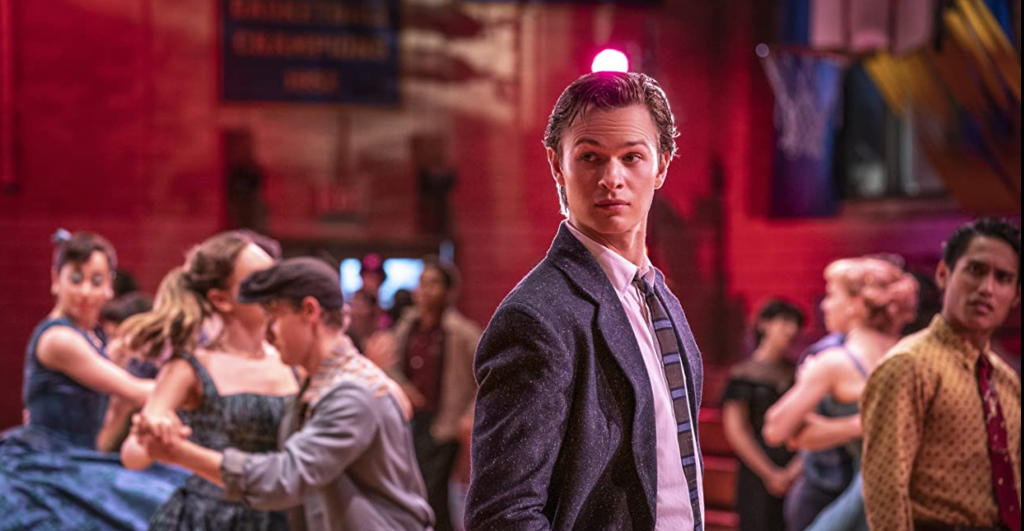
Q : Ansel, Tony’s story here is different than it was both the 1957 musical and the 1961 movie. I wondered if you watched the original, if that was something that you were really familiar with, before you are embarking on this. You’re known a little bit more as a dramatic actor although we know you can sing and dance and all that, what was it like to do that much singing and dancing in this movie.
Ansel Elgort : Yeah, it was absolute pleasure, I love singing and dancing ever since I was little kid, my father when he was 17, he saw the original production of “West Side Story” on Broadway. And he loved it, and then as a kid I was given like Steven, a burn CD of “West Side Story” and I listened to that. And I learned everything and then, of course I watched the movie, I loved the singing and the dancing.
So it’s always been kind of a dream of mine to be in a stage production of this or movie of this , to be able to work with all these masters and to honor the lyrics of Stephen Sondheim and to be able to work with Stephen Sondheim as well. And to be able to sing the melodies of Leonard Bernstein, and then to dance the reimagined choreography by Justin Peck and be able to sit in a room with Steven Spielberg and talk about who is this character and Tony Kushner hand us all of us actors pages of backstory, “This is who you are,” I mean it made it so easy because it was such a great collaboration.
We had so many amazing people to collaborate with and feeling pushed. Feeling like we wanted to honor this amazing work and Like Ariana said, “It could be something that now someone can give their kid, here’s this new movie, “West Side Story” and you gotta check it out and hopefully the legacy keeps going, one day someone make this 60 years from now again.
Ariana DeBose : Steven always says he’s like, “There’s so many young people of this generation many who’ve never heard of “West Side Story,” so like that’s I think sort of an unifying feeling, we’re making something for a new generation, so they can really think about tase themes, this is a very poignant story, there’s so many things that are discussed within, it’s a much more socially aware, take on a classic story and it makes us ask some deeper questions, how cool that we get to put the forth to people, I personally that was it for me.
Q : Well, speaking of being role models, too. David, it’s really wonderful to see Bernardo who is actually Latino. And it’s important for all of us Latinos to be able to see ourselves up there. You were in Billy Elliot, you’ve been doing this a long time, you won Tony when you were 14 years old. But you stopped doing this, so what brought you back?
David Alvarez : Steven Spielberg…he brought me back from dead. After Billy Elliot, I want to kind of discover my life what I wanted to bring into this world. I ended up joining the military. I was in the army for three years stationed in Alaska. And I ended up backpacking for another three years in Mexico, that’s where I got a message from Cindy Tolan, and she was telling me, “Hey, Steven Spielberg is making “West Side Story” and there’s a role for you if you want to send in a tape.” Then, finally when I got back to the United States, I prepared the tape. I thought it was just such a long shot, I had no expectations, but something inside of me told me, “Just do it and send it.” And I sent it, and here I am, it’s crazy to think about it.
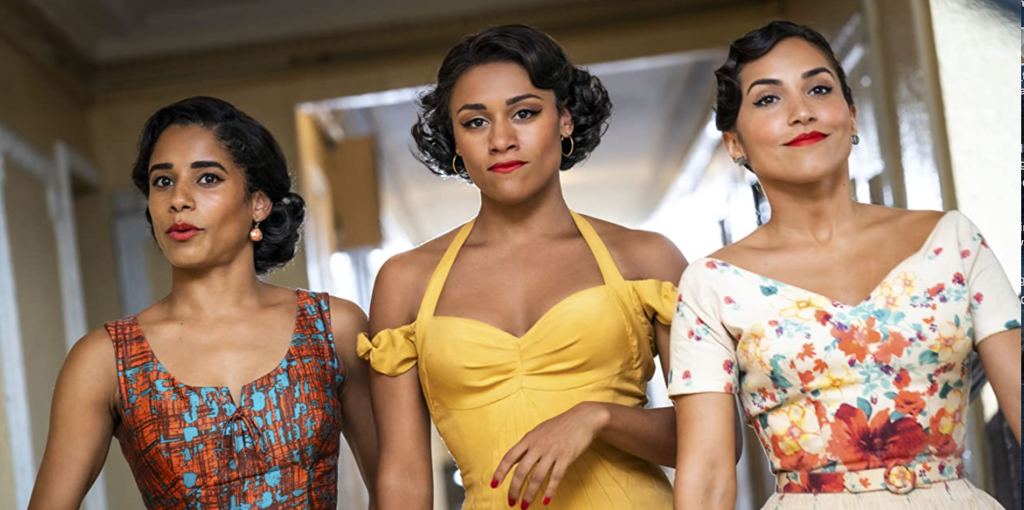
Q : Mike, I’d heard that different people in the cast were checking out the documentaries from that era to sort of steep themselves in what 1957 New York was like. How did you prepare for a role like Riff?
Mike Faist : Steven recommended a film, do you remember what that was for Frank Sinatra, and after the conversation, you gave me some homework.
Steven Spielberg : That’s amazing that I recommended a Frank Sinatra movie to you. I love that, because I love Frank Sinatra. But I’m trying to think..what was his best role was by Joe in “From Here to Eternity.”
Mike Faist ; Yeah, that was it. But then, in that session, one of the things initially Steven was asking what do you want your hair to be like, what do want that to be like, and we started going though these photos and I found these Bruce Davidson’s photo series of Brooklyn Gangs that came out in 1959. As you go through these photos of these kids and people, you see the inability to see past Tomorrow.
There’s a freedom with that and there’s also a depression with that. It’s very complicated and as I’m scrolling through these photos. And I came across this young man who looked thin as a rail and he had tattoos all over his body, and he was shirtless, and he was with four or five other guys walking along the Coney Island Boardwalk, they’re kind of like snapping and it look like they’re dancing, I was like that’s riff, you know.
And I remember that he had tattoo mom on one chest, and dad on other chest. You know, the sad thing is that he probably didn’t have mom and dad, I don’t know something this duality of who these people were the complications of the things that they really lacked, the reason for the inability to see past Tomorrow is because of the lack of opportunity that’s in front of them Today.
And the only thing that they can create and control is that tribal mentality that they existed within themselves and that’s kind of you know the origin story for anyone that’s been a gang. We’ve always heard like, there’s no opportunity and these people come to you and they say, “Well, join us, we’ll take care of you, you’re part of us now.” When you don’t have anyone else, it seems everything on page for these guys are taking care of you. They’re sticking up for you and they’re creating that familial thing for us. It was wild thing to explore and it was real honor.
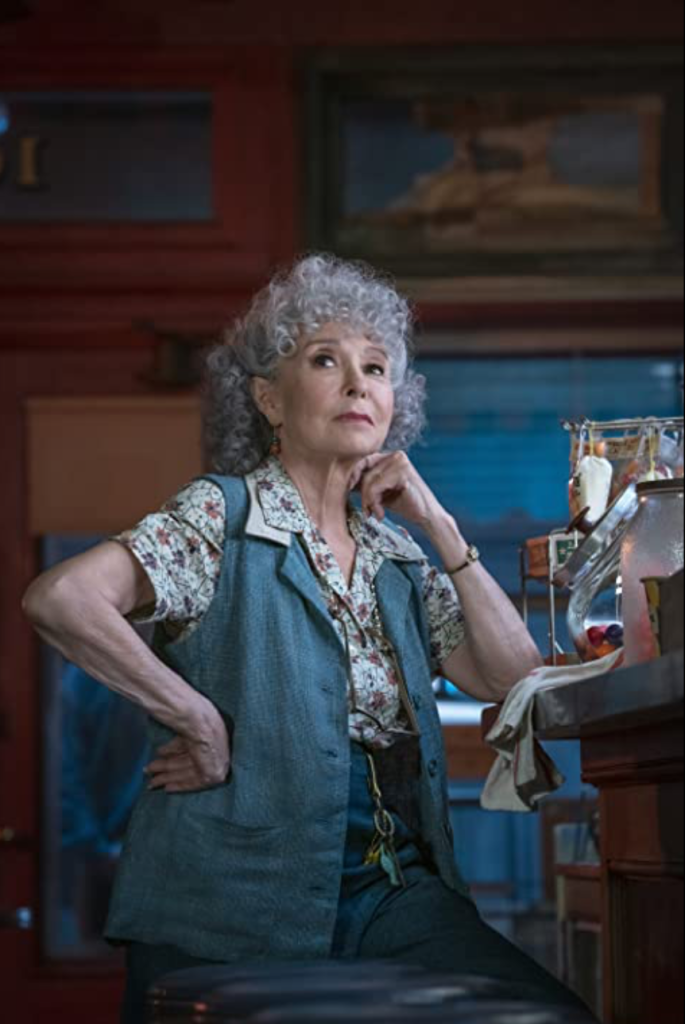
Q : Well, in addition to be in part of gangs, obviously this is a story about intolerance, prejudice and hatred surrounding that. Steven, I wanted to ask you, what would you like people to come away with after watch this film?
Steven Spielberg : Well, I think what I’d love people to come away with that, in order to avert or postpone tragedy, we have to learn to listen to each other. We have to learn not to shout each other down, we have to learn how to have a conversation with each other, especially those of us who have completely ideological differences. And every kind of differences. We have to understand that “West Side Story” which is a version of Romeo and Juliet except Romeo and Juliet wasn’t about race, and this is. And that’s what Jerome Robbins brought to this endeavor because he was the one that decide to make West Side Story to begin with in 1956 and mounted in 1957. So, it’s just that we’ve heard this thousands times, and maybe it’s a little more relevant Today, even though it may seem a bit like a cliche, but make love not work.
Q: That’s a beautiful note to wrap up.
Check out more Nobuhiro Hosoki’s articles.
Here’s the trailer of the film.

